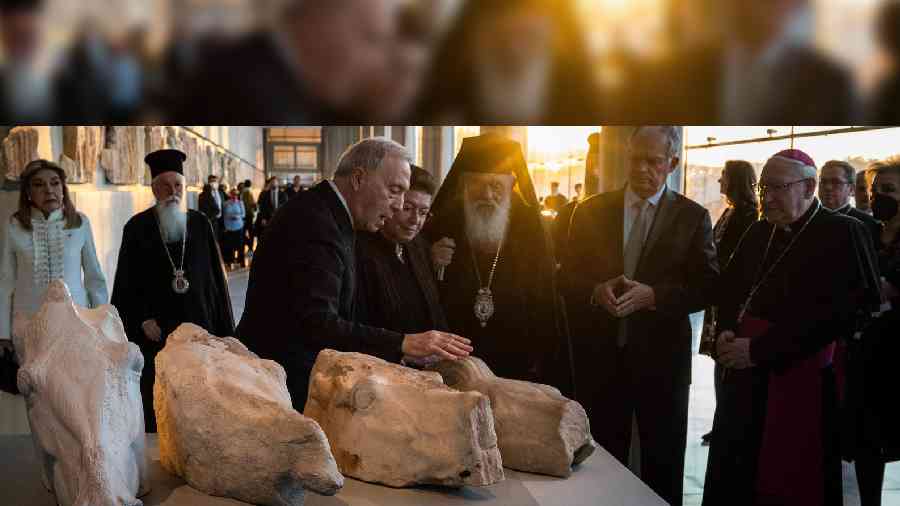Greece on Friday welcomed the return of ancient artifacts from the Acropolis in Athens, given in what the Vatican City classified as an "ecumenical donation" after the three pieces were taken more than 200 years ago.
Greek Culture Minister Lina Mendoni, visiting Catholic Bishop Brian Farrell, and the head of Greece's Orthodox Church, Archbishop Ieronymos II, led a ceremony for the repatriation of the three sculpture fragments at the Acropolis Museum.
"The gifting of fragments of the Parthenon which had been held in the Vatican Museums for more than two centuries, shows itself as a cultural and social gesture of friendship and solidarity with the people of Greece," Bishop Brian Farrell, the Vatican's secretary for promoting Christian unity, said.
"We assure you of our intimate joy at the realization of your legitimate wish to have the ... fragments at home in their place of origin," he added.
The Vatican first announced its intentions late last year in a papal decree.
What do the fragments depict?
The marble fragments include the head of a horse that was pulling the mythical goddess Athena's chariot, according to the Vatican Museums' website.
It comes from the west front of the building and where Athena and Poseidon, the god of the sea, are depicted competing for control of the city.
The second fragment depicts the head of a young male, believed to have originally been depicted carrying a tray of votive cakes offered during a procession to commemorate the founding of Athens.
The third was the head of a bearded male from a part of the building whose sculptures depicted a battle between the mythical Lapith group of people and part-horse, part-man Centaurs.
Greece seeking return of all Parthenon remnants
"Initiatives like these show the way, how the pieces of the Parthenon can be reunited, healing the wounds caused by barbaric hands so many years ago," Culture Minister Mendoni said, before moving on to Greece's efforts to recover the historic sculptures, from the British Museum in London in particular.
"This takes us to the just and moral demand of the entire Greek people, and of this government and its prime minister, for the final return of all the sculptures of the Parthenon," she said.
A museum in Sicily similarly returned a piece to Athens last year.
Carved in the 5th century BC, the sculptures from the Parthenon were taken in the early 19th century by British diplomat Lord Elgin before Greece won independence from the Ottoman Empire.
They are scattered around the world but many are at the British Museum.
Britain had in the past argued that this was done with approval from the occupying Ottomans at the time and so was legally valid; Greece countered that the Ottomans were not entitled to grant any such permission.
Talks held in 2022 but yet to bear fruit
Comments in 2022 earlier this year, including from the British Museum's new chair, former Finance Minister George Osborne, suggesting a "hybrid solution" where "the sculptures could be seen in both London and Athens." That idea had prompted hope of possible movement in the dispute.
However, neither the British nor the Greek governments have expressed much optimism publicly on the matter since.
Mendoni on Friday said Greece would be willing to lend the British Museum ancient Greek artifacts to "fill the gap" if the so-called Elgin Marbles (as the musuem dubs its collection) were returned, with one legal sticking point a dispute over recognition either of ownership or exchange in any possible accord.
"Greece cannot recognize possession and ownership by the British Museum because it considers the sculptures to be there as a product of theft," she said.
The Vatican had circumvented the legal question of ownership by describing its gesture as an "ecumenical donation" to Greece and its Orthodox Church.











